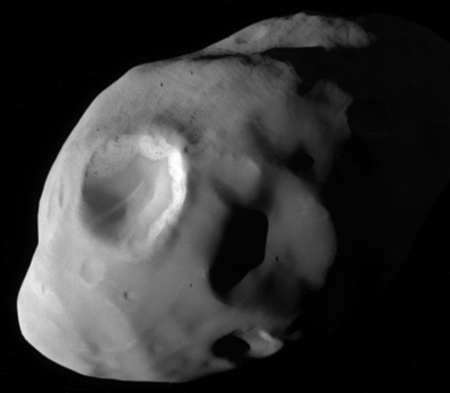Close-up of Pandora

Cool image time! The image on the right, cropped and reduced to show here, is that of Saturn’s small moon Pandora. The full resolution image was taken on December 18, 2016 during Cassini’s closest fly-by of the Moon ever. It was taken from a distance of 25,200 miles, and has a resolution of 787 feet per pixel.
Note the pooling of dust-like material in the crater. Note also the brighter exposed surfaces on the inner crater rim above that pooled material. It appears to my eye almost as if the dust that had coated the higher elevations of this inner rim has for some unknown reason suddenly settled into the crater’s floor.
Pandora orbits just outside Saturn’s F ring, which means it is well exposed to the material in the ring. I would also expect that much of its surface is well coated with particles from the rings.

Cool image time! The image on the right, cropped and reduced to show here, is that of Saturn’s small moon Pandora. The full resolution image was taken on December 18, 2016 during Cassini’s closest fly-by of the Moon ever. It was taken from a distance of 25,200 miles, and has a resolution of 787 feet per pixel.
Note the pooling of dust-like material in the crater. Note also the brighter exposed surfaces on the inner crater rim above that pooled material. It appears to my eye almost as if the dust that had coated the higher elevations of this inner rim has for some unknown reason suddenly settled into the crater’s floor.
Pandora orbits just outside Saturn’s F ring, which means it is well exposed to the material in the ring. I would also expect that much of its surface is well coated with particles from the rings.
